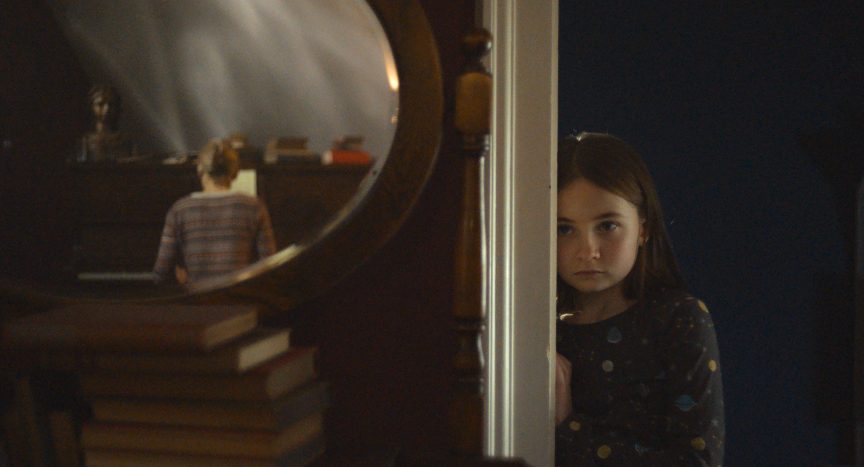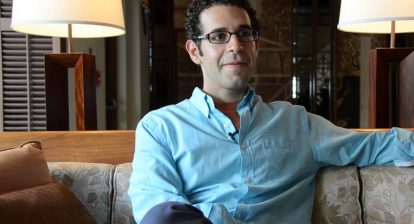With a title like Martyrs Lane, you might be expecting something relentlessly gory, but Ruth Platt’s third feature doesn’t actually take place in the eponymous spot. Rather, it’s key to unlocking the mystery that surrounds the creepy old vicarage in which young protagonist Leah (Kiera Thompson) lives with her family, most of whom barely acknowledge her existence except to scold the little girl. Plenty of ghost stories have dealt with grief before, but here it’s writ large in the form of a very real presence in this strangely cold home – bustling with activity during the day but eerily silent at night save for Leah’s mother’s screams, which frequently disturb her sleep. Whether personified or imagined, suffice to say there’s something unsaid lurking within these walls that wants to come out.
Martyrs Lane kicks off with a striking shot of an empty road, the camera crawling along like a bug. Annoyingly, the rest of the movie is oddly static, this shot representing one of the only times Platt diverts from filming the action head on, which gives it an oddly televisual style, like a fussy BBC drama or something. Likewise, although the camera begins at Leah’s height, this potentially intriguing idea is almost immediately dropped in favor of hanging out with the adults looming over her. This exemplifies the strange struggle at the heart of Martyrs Lane, between telling a story from a child’s perspective and telling it in a way that’s going to make sense to the adults watching. If Platt had committed to Leah completely, maybe what comes later would’ve been easier to swallow.
Leah is a lonely child with debilitating asthma who’s already having creepy visions when we meet her (it’s unclear whether this is a new development). Her whole existence is contained to a strict religious community presided over by her father, so naturally there are already questions about death and mortality buzzing around Leah’s head. One night, she’s visited by another little girl (Sienna Sayer, whose wooden line delivery leaves a lot to be desired) with tattered wings who claims to be an angel. However, Leah notices marks on her body that suggest she’s neither fully human nor a guardian spirit. After nightly games of Two Truths and a Lie, Leah begins a quest to figure out who this little girl really is but, in doing so, she risks revealing a family secret that’s been buried deep for a reason.
See Also: Midnight is Next-Level Horror [Fantasia 2021 Review]
Platt has said that she hopes Martyrs Lane can comment on “the small but devastating slow-burn destruction of unprocessed grief,” a worthy ambition that doesn’t come across whatsoever. Much of the director’s own experience, and her mother’s, informed the story, which is why it’s so disappointing that nothing in the film connects in any real way. It’s immediately obvious who the spectral little girl is, and the overly determined storytelling techniques employed while we’re waiting for Leah to figure it all out are grating. There’s no sense of this house ever being a real family home, from Leah’s distant parents to her bully of an older sister who does a complete 180 for no apparent reason towards the end, seemingly because she suddenly remembers their shared trauma. When spooky stuff starts happening, it’s par for the course, rather than a deliberate twist on what’s come before.
There are some great shots of the ghostly child running around behind Leah but otherwise this isn’t a particularly scary, or even atmospheric, movie. The most frightening part about it is how much of a pain Leah is, in fact, and the sequences involving the two youngest actors are borderline interminable due to the drama school affectations from both kids (Thompson fares slightly better than Sayer, but she’s in way over her head regardless). Telling a story like this from a child’s point of view is an interesting idea, but because it means waiting for Leah to piece together stuff we’ve already figured out long before her, there’s no tension to the big reveal. Likewise, the denouement is a complete mess, as though Platt ran out of roads to take her story down and decided to simply toss everything out the window instead.
Martyrs Lane is terribly overwrought but the story itself is quite thin, leading to long, repetitive sequences where nothing much is gleaned that we haven’t already worked out on our own. A shot of Leah walking upside down on the ceiling, and a prized lock of hair kept in a locket, hint at what could’ve been if Platt had loosened up a little bit and focused more on concocting a fairy-tale, in every sense of the word, rather than making some deep, unsatisfying treatise on grief that’s about as flimsy as those damn fairy wings.
WICKED RATING: 4/10






